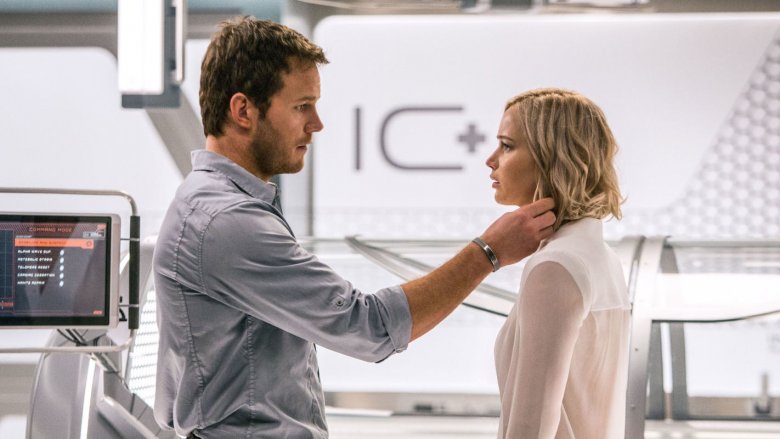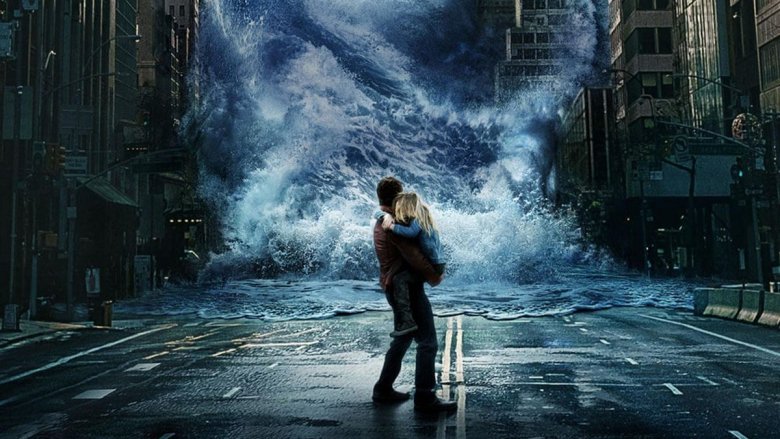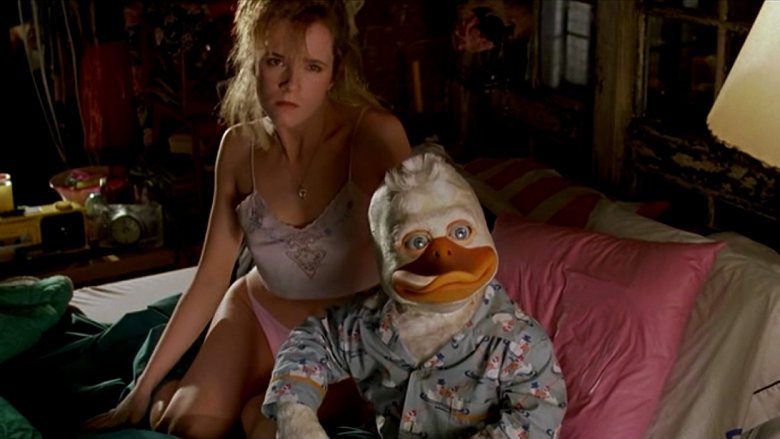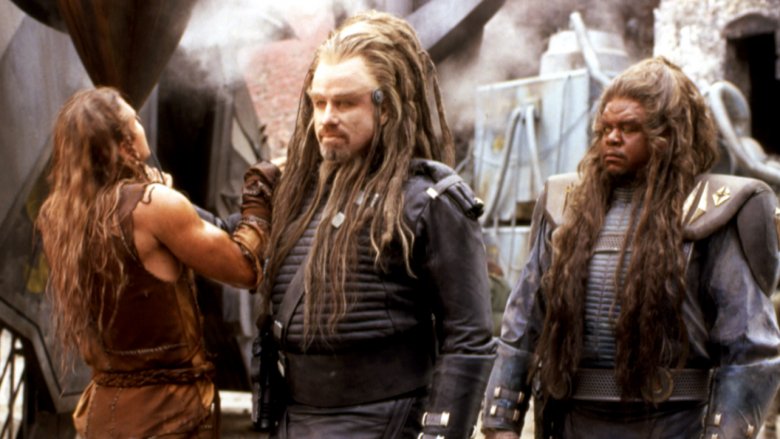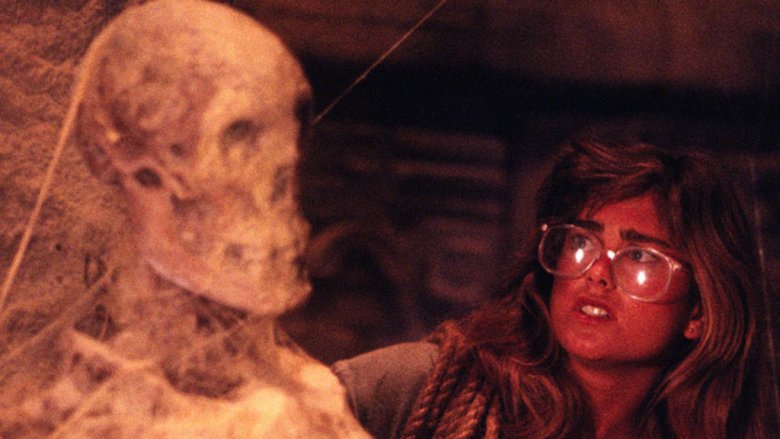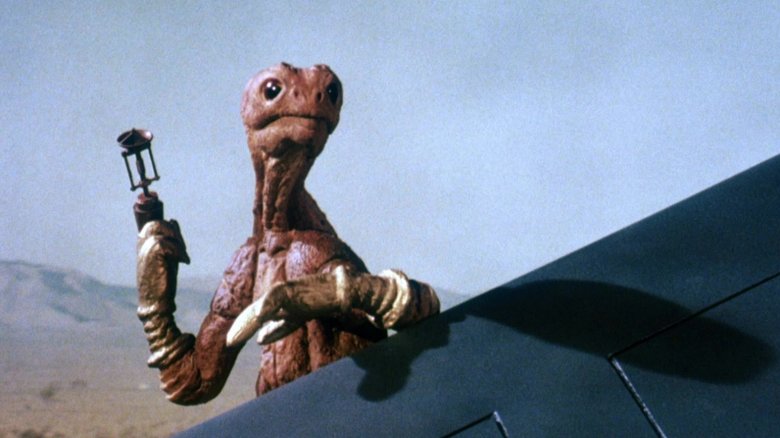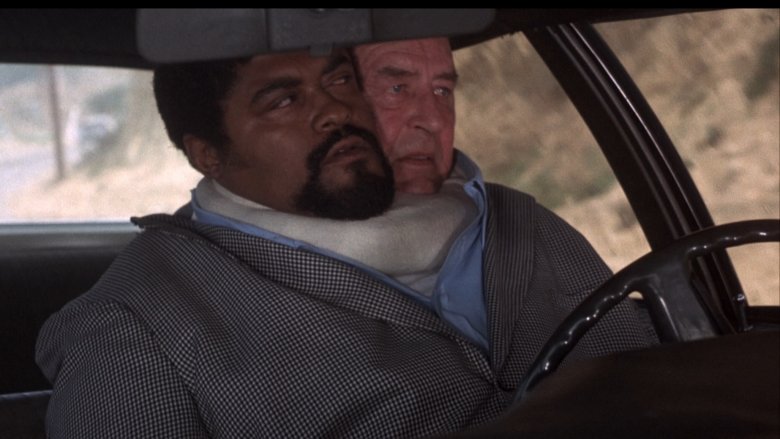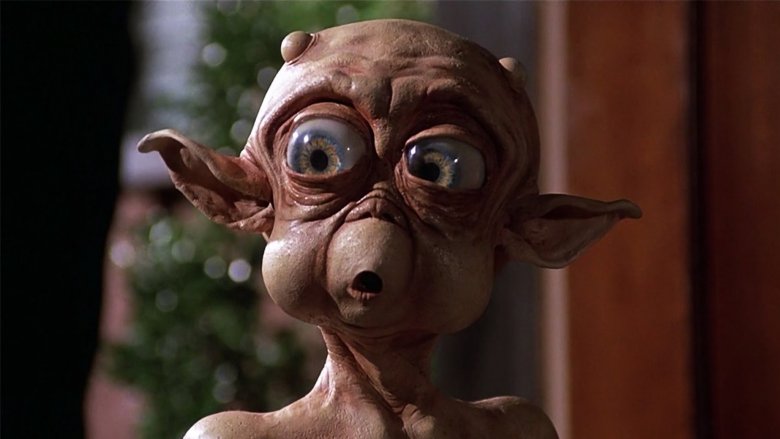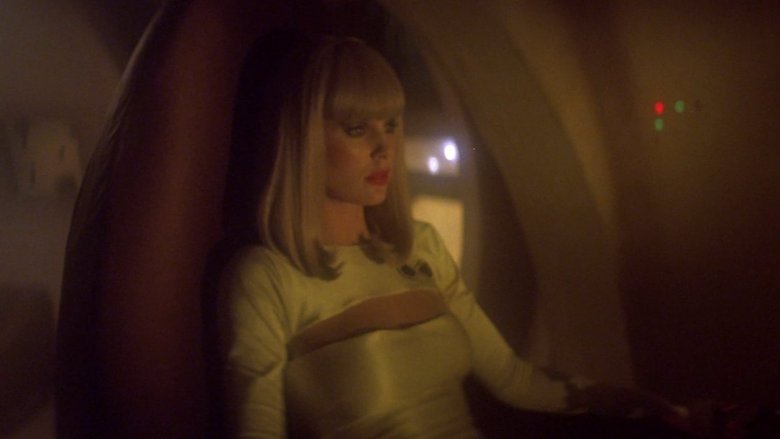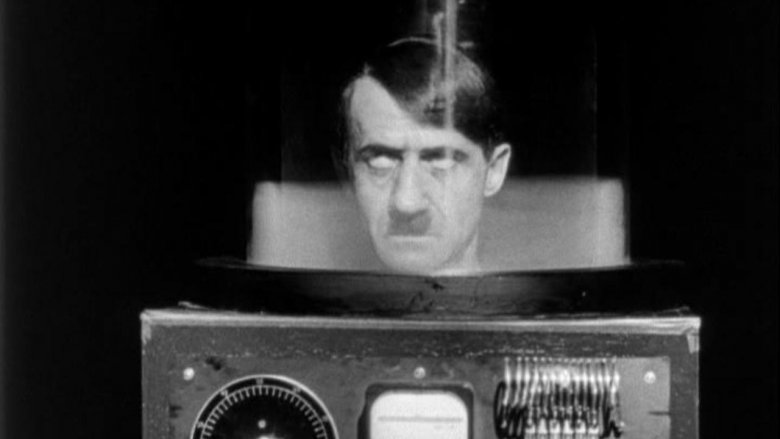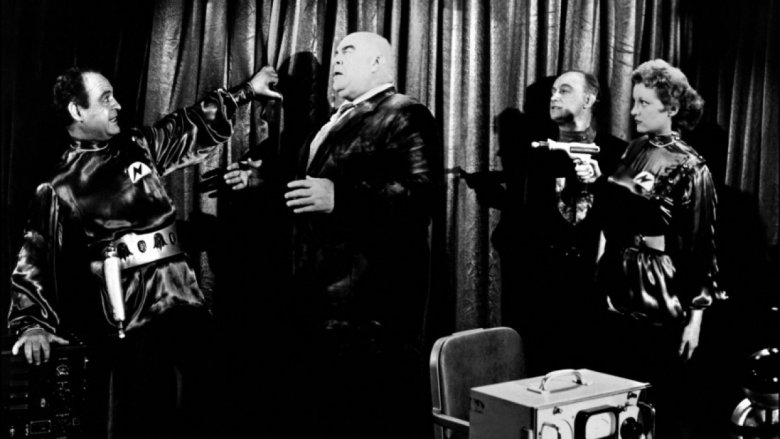The Worst Sci-Fi Movies Ever Made
Filmgoers have loved science fiction cinema for about as long as we've had movies — but as popular as the genre has always been, it has some major pitfalls. An effective sci-fi movie requires the creation of an environment that's fundamentally unfamiliar in some way, whether it's a futuristic setting, a parallel civilization, or a variation on our world that's been altered by the incursion of otherwordly forces. This can make for a singularly amazing movie, as it has with sci-fi classics from Metropolis to Star Wars to Arrival. If it's mishandled, on the other hand, it results in something far more glaring in its missteps than just your basic poorly made earthbound movie. Creating a world that doesn't make any sense, or is unappealing to viewers, leads to a movie that's bound to be mocked if it gets noticed at all.
The following films committed a variety of unforgivable science fiction sins. Whether it's failing to create an interesting new world, forgetting to come up with characters that viewers wanted to spend time with, or bungling the details of a potentially intriguing story, they all came up short — and they all deserve to be ranked among the worst sci-fi movies ever made.
Passengers
2016's Passengers looked good on paper, which is ironic since it was ruined by its script. Director Morten Tyldum had just been nominated for a Best Director Oscar for The Imitation Game. Chris Pratt and Jennifer Lawrence were both huge movie stars when they were cast as the leads, two strangers who find themselves awake on a malfunctioning sleeper ship in deep space, falling in love as they live out their lives on the ship itself instead of the colony they'd been traveling to. The ads made it look like a beautiful science fiction romance. Then people actually saw the movie, and were shocked at what actually happens.
Pratt's character is woken up by a ship malfunction, and spends a year in total isolation. Then he discovers Lawrence's character, still asleep in her hibernation pod. Even though he knows she won't be able to reenter hibernation and will therefore be robbed of her life on the colony planet, he deliberately wakes her up so he won't be alone. Although she's justifiably angry when this truth is revealed, a dramatic finale where the pair save the ship leads her to accept spending her life with him. Critic Rebecca Hawkes called Passengers "a creepy ode to manipulation." Many others agreed that the creepiness of Pratt's actions, and the fact that they're ultimately forgiven, ruined their enjoyment of the movie, which sits at 31 percent on Rotten Tomatoes.
Geostorm
Geostorm wanted to be an epic sci-fi disaster movie, but it ended up just being a disastrous movie. The directorial debut of screenwriter/producer Dean Devlin, it told the big-budget story of a system of weather control satellites that destroy cities in all sorts of unique ways after a mysterious saboteur corrupts them. Unfortunately, it lacked the sort of Dwayne Johnson/Will Smith/Bruce Willis star that you need to hold this kind of movie together, relying instead on the adequate but uninspiring Gerard Butler.
Butler plays the former head of the weather control agency, who's given the task of investigating the destructive satellites, ultimately revealing a conspiracy led by the U.S. Secretary of State (Ed Harris). By the time the full plot is revealed, an Afghani village has been frozen solid, Hong Kong has been hit by a firenado, a huge hailstorm has hit Tokyo, and a lightning storm has destroyed the stadium where the Democratic National Convention is happening. None of it looks terribly real, and all of it feels dreadfully familiar. With nothing to offer beyond destruction, the film was a critical embarrassment and a box office failure.
Howard the Duck
Produced by George Lucas, 1986's Howard the Duck is a movie with all sorts of problems. It's based on a Marvel comic book about a sarcastic talking duck from another dimension, but where the comic is satirical, the movie doesn't really have a point of view. It does however, have a sexual relationship between a human woman and a duck, which a lot of viewers found pretty creepy. It also has an animatronic lead character whose face simply doesn't move well enough to give him much of a personality. Legendary film critic Gene Siskel spoke for audiences everywhere when he asked, "Who was this stupid film made for?"
The answer to Siskel's question is pretty much nobody, at least if we're going by the number of people who went to see it. Years before their stable of comics characters conquered the box office, Howard the Duck offered sadly persuasive evidence that Marvel wasn't anywhere close to being ready for Hollywood.
Battlefield Earth
By the time it reached theaters in 2000, Battlefield Earth had been a well-known passion project of John Travolta's for years. The movie is based on a novel by L. Ron Hubbard, who also founded Scientology, the religion to which Travolta subscribes. When the book was published in 1982, Hubbard reportedly hoped that Travolta made help get it made into a movie, but Travolta's career was on the rocks at the time, and wouldn't recover until he starred in Pulp Fiction in 1994. Even then, the connection to Scientology made the project controversial, and most studios weren't interested; it ultimately fell to Franchise Pictures, which over-reported the budget to investors to the tune of $31 million, leading eventually to a lawsuit that would bankrupt the company.
The delay complicated things for Travolta, who'd originally planned on playing the human hero, but realized he was too old and decided to play the alien villain instead. The aliens, called Psychlos, are hairy giants; in the novel, they have inhuman faces usually covered by breathing masks, but with Travolta and Forest Whitaker playing them, they were understandably given human faces and leonine manes, making for a truly bizarre image.
As for the movie itself? Critic Roger Ebert compared it to "taking a bus trip with someone who has needed a bath for a long time" and added, "It's not merely bad; it's unpleasant in a hostile way." Some were fearful the movie was propaganda for Scientology, but Ebert let Battlefield Earth off the hook on that count, saying that it "contains no evidence of Scientology or any other system of thought; it is shapeless and senseless, without a compelling plot or characters we care for in the slightest." Other critics were no kinder, and audiences stayed away in droves.
Alien from L.A.
The most notable thing about 1988's Alien from L.A. is that it stars Kathy Ireland, an extremely popular model of the 1980s. Ironically, the famous beauty plays an awkward nerd who only becomes "hot" over the course of the movie as she journeys through the strange underground civilization of Atlantis in search of her father. Directed by noted schlockmeister Albert Pyun, the movie is dull and visually unappealing, despite Ireland's presence. Looks aside, she's not much of an actor either, although she'd be out of place in this film if she was.
Putting a new and different spin on an old legend is a time-honored sci-fi tradition, but putting Atlantis under the dirt instead of under the sea just feels like the cheaper choice, particularly since there's nothing interesting or cool about the subterranean city as portrayed in the movie. The whole thing is an exercise in tedium, memorable only for the episode of Mystery Science Theatre 3000 that makes fun of it.
Laserblast
Laserblast also earned a Mystery Science Theatre 3000 episode, but it earns its distinction as one of the worst sci-fi movies ever made while coming across as far more comfortable with its low aspirations. It tells the story of a bullied teenage boy who finds a big laser cannon and a matching badge out in the desert. He figures out that when he wears the badge, he can fire powerful blasts from the cannon. However, the badge starts growing into his body, and the power slowly turns him into a monster. Not just in the sense that he starts to callously kill people with the weapon, but also that his skin turns green and his face becomes demonic. He's also the target of some dinosaur-like alien cops, who ultimately put an end to him before his destruction spreads too far.
The aliens, which were created with stop-motion effects, are easily the best part of the movie. Director Charles Band has claimed the design of E.T. The Extra Terrestrial was directly based on them. Whether or not that's true, the unique and charming creatures are the bright spot in an otherwise mean and nasty little film.
The Thing with Two Heads
You can't really tell from the title (but you can totally tell from the poster) that The Thing with Two Heads is part of the same blaxploitation horror trend that gave audiences the far more popular Blacula, which also came out in 1972. The ludicrous story is about Maxwell Kirshner (Ray Milland), a racist old white man who attempts to cheat death by having his head transplanted onto another body. That's how he ends up sharing shoulders with Jack Moss (Rosey Grier), an innocent black man who was unfairly sentenced to death and volunteered for medical experiments to avoid the electric chair.
The two men struggle for control of Jack's body, until Jack finds an ally in Dr. Williams (Don Marshall), a black surgeon who Kirshner had previously mistreated, and rids himself of the caucasian parasite. If race wasn't a factor, The Thing with Two Heads would still be one of the worst sci-fi movies ever made, starring two guys awkwardly pressed together as they unsuccessfully attempt to look like they have one body. Adding the extremely dated attempts at racial commentary and humor really pushes it over the top into something you should watch at your own risk.
Mac and Me
Producer R.J. Louis believed it was time for "a new generation to have its E.T.," which was certainly an odd perspective because his deliberately E.T.-esque family film Mac and Me came out in 1988, only six years after E.T.'s release. Louis had a working relationship with McDonald's from his time in advertising, and had a grand plan to get them involved in cross-marketing the movie. Apparently a big part of the goal was to raise money for the Ronald McDonald House charity, but the whole thing struck audiences as a marketing effort for the fast food chain, with critic Chris Hicks commenting, "I'm not sure I've ever seen a movie that is as crass a 90-minute commercial as Mac and Me."
On top of that, the plot really did feel like a ripoff of E.T., but with worse special effects and an alien who was not nearly as cute and way creepier. The young boy that Mac befriends is disabled, played by Jade Calegory, who has Spina Bifida and uses a wheelchair in real life. That's actually pretty cool, but the way the movie constantly puts him in physical danger is off-putting. One such scene, featuring Calegory rolling down a hill and off a cliff into a lake, has become widely seen thanks to Paul Rudd showing it every time he goes on Conan O'Brien's talk show.
Galaxina
Galaxina was an attempt to make a fun, sexy movie in the mold of Barbarella. Unfortunately, Galaxina didn't have the talent of Barbarella star Jane Fonda or director Roger Vadim; instead, it had Playboy Playmate Dorothy Stratten and director William Sachs, who had previously made The Incredible Melting Man (also one of the worst sci-fi movies ever made). Stratten was certainly beautiful and looked good in her tight costume, but she was actually playing a sexless (though still sexualized) android, and doesn't even talk until she reprograms herself halfway through the movie. Sachs attempts to parody sci-fi hits like Star Wars and Alien, but as critic Jeffrey Anderson put it, "the jokes are little more than references and they simply don't work."
Stratten was murdered by her estranged husband two months after the movie was released, which cast a pall over the film that made it difficult to enjoy for whatever silly pleasures it had to offer. These days, rather than being discussed on its own merits, it mostly comes up as an addendum to Stratten's tragic real-life story.
They Saved Hitler's Brain
They Saved Hitler's Brain has a 1963 copyright, but that's misleading. The film that came out in 1963 was called The Madmen of Mandoras, although saving Hitler's brain did turn out to be what the titular madmen were up to. Years later (nobody has pinned down exactly when), UCLA film students were hired to expand the movie by 25 minutes, to make it a better length for TV syndication. They added an entire prologue, which is far too late-'60s to resemble the footage from the original. It features two characters who appear to be the heroes, but then get shot and killed by the bad guys just in time for the original 1963 protagonist to take over.
Even before this, The Madmen of Mandoras was a mess of a movie, about scientists in a poorly realized fictional South American country who have preserved not just Hitler's brain but his entire living head, which still shouts commands in German. The addition of that pointless 25 minutes, however, transforms They Saved Hitler's Brain from a merely terrible movie into a downright painful display that definitely deserves to be ranked among the worst sci-fi movies ever made.
Plan 9 from Outer Space
For decades, Ed Wood's 1959 movie Plan 9 from Outer Space was widely considered the worst movie ever made. Wood's shoddy directing style, laughable dialogue, and tendency to cast his weird gang of friends and hangers-on resulted in an accidental comedy classic. Lines like "Because all you of Earth are idiots" and "Future events such as these will affect you in the future" are juxtaposed with pie-plate flying saucers, cardboard gravestones, and the mugging of Tor Johnson and Vampira as alien-resurrected zombies. Bela Lugosi is in it as well, but because he was dead by the time production got underway, his screentime is limited to some footage that Wood — who was close friends with the Dracula star — had previously shot of the actor standing around not doing much. In other scenes, Lugosi's character was portrayed by a completely different actor holding a cap over his face.
There's an argument to be made that Plan 9 from Outer Space is "so bad it's good" to a degree that should disqualify it from this list. No sci-fi movie has ever received more acclaim for being terrible, however, so it just feels wrong to leave it off.
